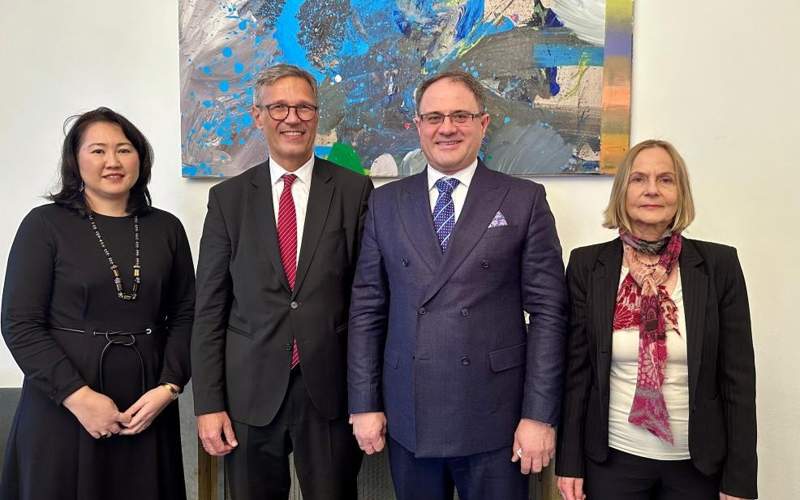Kazakhstan and Germany discuss topical issues of bilateral cooperation in Berlin

During his working visit to Berlin, Deputy Foreign Minister of Kazakhstan Roman Vassilenko, met with Matthias Lüttenberg, the Commissioner for Eastern Europe, the South Caucasus, and Central Asia at the German Federal Foreign Office, Kazinform News Agency cites the press service of the Kazakh MFA.
During the meeting, held in the spirit of mutual understanding and open dialogue, the sides discussed a wide range of issues on the bilateral, regional and international agenda, including a number of proposals on the implementation of the agreements reached at the highest level during this year.
The Kazakh diplomat highly appreciated the dynamics of bilateral relations in 2023: “The mutual visits of the presidents of our two countries – Frank-Walter Steinmeier to Kazakhstan and Kassym-Jomart Tokayev to Germany – as well as the negotiations between our countries' foreign ministers – Murat Nurtleu and Annalena Baerbock – gave a serious impetus to the development of political dialogue”.
In turn, Lüttenberg a positively assessed the cooperation between Kazakhstan and Germany and expressed readiness to work on strengthening the strategic regional partnership within the framework of the adopted Joint Statement of the Heads of State of Central Asia and the Federal Chancellor of Germany.
During the negotiations, special attention was paid to climate change issues. Thus, the interlocutors agreed that the climate agenda in the Central Asian region is currently becoming particularly relevant, due to the deterioration of the environmental situation, the growing shortage of water resources, and drought, which has a negative impact on the entire region.
Roman Vassilenko informed the German partners about Kazakhstan's renewed national commitments under the Low Carbon Development Strategy, decarbonization efforts towards achieving the Paris Agreement objectives, and biodiversity conservation. He mentioned Kazakhstan's recent participation in the World Climate Summit COP-28 in the UAE and joining the Global Commitment to reduce methane emissions.
The German side showed interest to initiatives of the Head of our State to establish a Central Asian Project Office for Environmental Protection and to host the Regional Climate Summit in Kazakhstan in 2026 under the UN's aegis.
Lüttenberg noted Kazakhstan's accession to the Climate Club, invited by Federal Chancellor Olaf Scholz, as a positive example of the evolving cooperation in this domain. The parties also positively assessed a number of cooperative environmental projects within the framework of the German Green Central Asia initiative.
The meeting also discussed the development of co-operation in the energy sector.
In the transport and logistics sector, the growing role of the “Middle Corridor” has been noted, which is the shortest route for the supply of goods and products from Central and East Asia to Europe.
The diplomats of the two countries expressed satisfaction with the observed positive dynamics of mutual trade turnover.

On the same day, Roman Vasilenko visited the leading German scientific and analytical center, the Foundation for Science and Politics (Stiftung Wissenschaft und Politik).
During the conversation with the director of the foundation, Stefan Major, topical issues of the international agenda were discussed, including regional security, commodity cooperation, and the development of trade and energy ties between Kazakhstan and Germany.
The sides exchanged views on the development of cooperation between the Central Asian states, Kazakhstan's initiatives and promising areas of cooperation with Germany.
Prospects for further deepening the Fund's interaction with analytical centers in Kazakhstan were discussed.
For reference: The Foundation for Science and Policy (SWP) is one of Europe's largest analytical centers in security policy, international and European politics.
It provides research-based advice to the Bundestag and the Federal Government of Germany and offers services to political decision-makers in international organizations – the EU, NATO and the UN.
The SWP employs approximately 200 staff members and collaborates with visiting researchers, fellows and interns.
